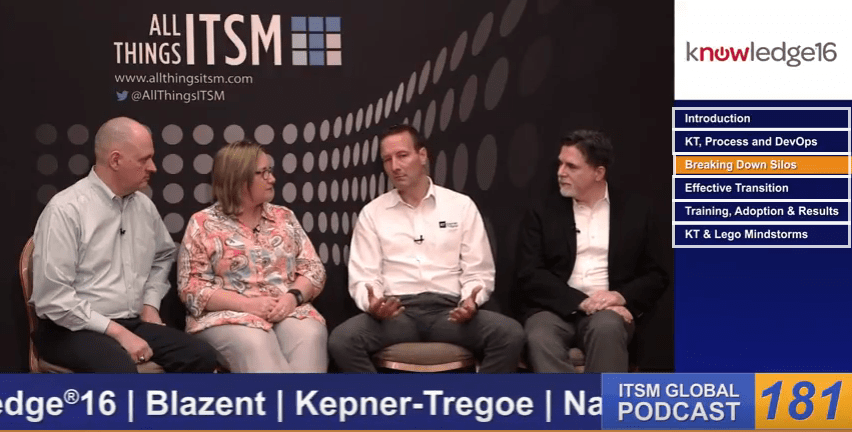In a recent All Things ITSM podcast at Knowledge 16, I was asked about my thoughts on Agile and DevOps.
It’s no secret to anybody in IT that DevOps is currently the hottest topic in the ITSM sphere as organizations try to break down the barriers between “Dev” and “Ops” to speed up innovation, enabling continuous development and release of new features and services.
While companies like Spotify have shown how they have built a new engineering culture on this new paradigm from the ground up, many legacy IT organizations have a completely different challenge in front of them as they try to move from the old “IT factory model” to a new, more horizontally aligned, agile collaboration model.
The issue is not so much on the development side as it is on the operations side, where many organizations still lack basic integration of fundamental IT processes like Incident Management (IM), Problem Management (PM) and Change Management (CM).
We are seeing this daily in our work with clients where we find IM, PM and CM under different leadership, with different priorities and few interfaces to ensure good hand-over of data. What is often missing is the end-to-end (customer) process perspective of three disciplines that, in this case, are ultimately all about resolving client and technical issues faster and permanently, while maximizing IT availability.
Personally, I believe this has a lot to do with how frameworks like ITIL® have been, shall we say, “misinterpreted”. While one of their main objectives was to build a more process-focused culture, many organizations have taken them as a rationale to build entire functions around the different processes, which, in many businesses have ended up as silos that rarely interact with each other.
With or without DevOps, we need to ask ourselves what value we are bringing to the customer by breaking up these disciplines versus aligning and integrating them across a common purpose, with the ultimate business goal of improving uptime and the customer experience. At that point, we might be ready to move to DevOps, which is all about “horizontal business management” and aligning multi-disciplinary teams, with different skill sets, around a common purpose (rather than structure).
However, reintegrating the Ops-side of the business is more than just aligning organizations and teams on a piece of paper. Changing the org-chart, in and of itself, will have no impact on business outcomes. This realignment needs to go hand-in-hand with a decluttering of our processes, removing non-value-added work, enabling our people by giving them skills to work across a broader range of disciplines. We need to reward them for the right behavior (not limiting their thinking by putting them in a certain box) and cleaning up our tooling landscape to ensure we can create meaningful knowledge and are able to automate simple, recurring tasks.
Only then will we be able to harness the true value of DevOps.



